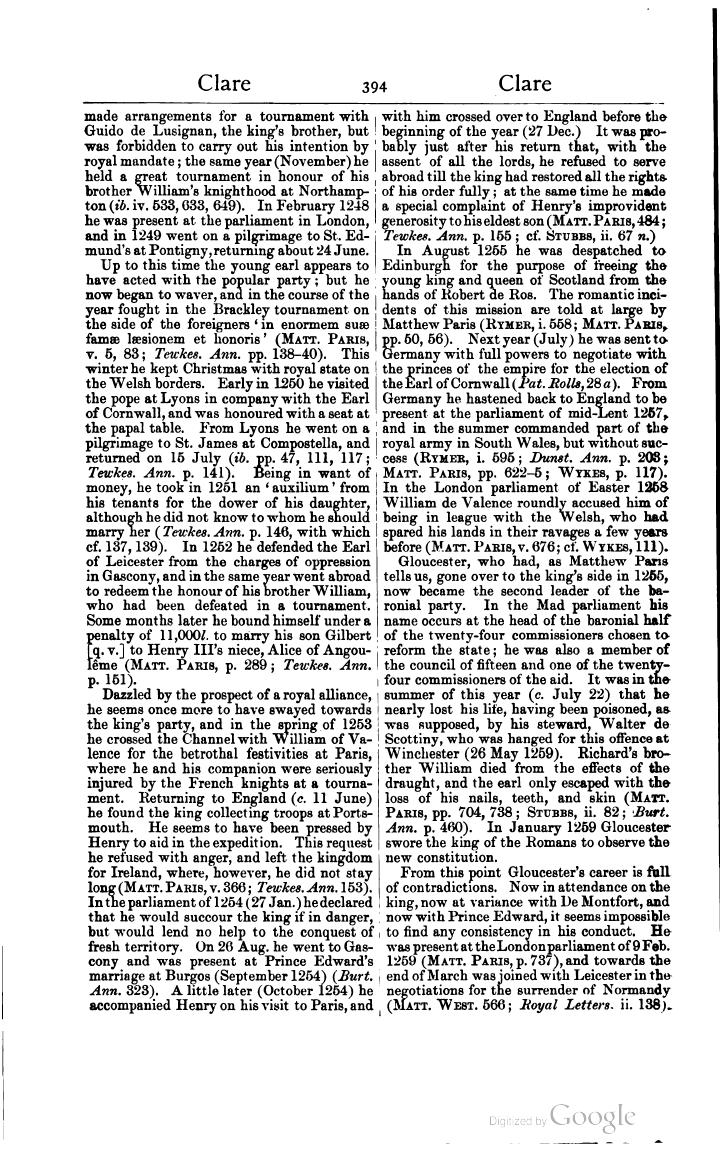made arrangements for a tournament with Guido de Lusignan, the king's brother, but was forbidden to carry out his intention by royal mandate; the same year (November) he held a great tournament in honour of his brother William's knighthood at Northampton (ib. iv. 533, 633, 649). In February 1248 he was present at the parliament in London, and in 1249 went on a pilgrimage to St. Edmund's at Pontigny, returning about 24 June.
Up to this time the young earl appears to have acted with the popular party; but he now began to waver, and in the course of the year fought in the Brackley tournament on the side of the foreigners in enormem suæ famæ læsionem et honoris (Matt. Paris, v. 5, 83; Tewkes. Ann. pp. 138-40). This winter he kept Christmas with royal state on the Welsh borders. Early in 1250 he visited the pope at Lyons in company with the Earl of Cornwall, and was honoured with a seat at the papal table. From Lyons he went on a pilgrimage to St. James at Compostella, and returned on 15 July (ib. pp. 47, 111, 117; Tewkes. Ann. p. 141). Being in want of money, he took in 1251 an auxilium from his tenants for the dower of his daughter, although he did not know to whom he should marry her (Tewkes. Ann. p. 146, with which cf. 137, 139). In 1252 he defended the Earl of Leicester from the charges of oppression in Gascony, and in the same year went abroad to redeem the honour of his brother William, who had been defeated in a tournament. Some months later he bound himself under a penalty of 11,000l. to marry his son Gilbert [qv.] to Henry III's niece, Alice of Angoulême (Matt. Paris, p. 289; Tewkes. Ann. p. 151).
Dazzled by the prospect of a royal alliance, he seems once more to have swayed towards the king's party, and in the spring of 1253 he crossed the Channel with William of Valence for the betrothal festivities at Paris, where he and his companion were seriously injured by the French knights at a tournament. Returning to England (c. 11 June) he found the king collecting troops at Portsmouth. He seems to have been pressed by Henry to aid in the expedition. This request he refused with anger, and left the kingdom for Ireland, where, however, he did not stay long (Matt. Paris, v. 366; Tewkes. Ann. 153). In the parliament of 1254 (27 Jan.) he declared that he would succour the king if in danger, but would lend no help to the conquest of fresh territory. On 26 Aug. he went to Gascony and was present at Prince Edward's marriage at Burgos (September 1254) (Burt. Ann. 323). A little later (October 1254) he accompanied Henry on his visit to Paris, and with him crossed over to England before the beginning of the year (27 Dec.). It was probably just after his return that, with the assent of all the lords, he refused to serve abroad till the king had restored all the rights of his order fully; at the same time he made a special complaint of Henry's improvident generosity to his eldest son (Matt. Paris, 484; Tewkes. Ann. p. 155; cf. Stubbs, ii. 67 n.).
In August 1255 he was despatched to Edinburgh for the purpose of freeing the young king and queen of Scotland from the hands of Robert de Ros. The romantic incidents of this mission are told at large by Matthew Paris (Rymer, i. 558; Matt. Paris, pp. 50, 56). Next year (July) he was sent to Germany with full powers to negotiate with the princes of the empire for the election of the Earl of Cornwall (Pat. Rolls, 28 a). From Germany he hastened back to England to be present at the parliament of mid-Lent 1257, and in the summer commanded part of the royal army in South Wales, but without success (Rymer, i. 595; Dunst. Ann. p. 203; Matt. Paris, pp. 622-5; Wykes, p. 117). In the London parliament of Easter 1258 William de Valence roundly accused him of being in league with the Welsh, who had spared his lands in their ravages a few years before (Matt. Paris, v. 676; cf. Wykes, 111).
Gloucester, who had, as Matthew Paris tells us, gone over to the king's side in 1255, now became the second leader of the baronial party. In the Mad parliament his name occurs at the head of the baronial half of the twenty-four commissioners chosen to reform the state; he was also a member of the council of fifteen and one of the twenty-four commissioners of the aid. It was in the summer of this year (c. July 22) that he nearly lost his life, having been poisoned, as was supposed, by his steward, Walter de Scottiny, who was hanged for this offence at Winchester (26 May 1259). Richard's brother William died from the effects of the draught, and the earl only escaped with the loss of his nails, teeth, and skin (Matt. Paris, pp. 704, 738; Stubbs, ii. 82; Burt. Ann. p. 460). In January 1259 Gloucester swore the king of the Romans to observe the new constitution.
From this point Gloucester's career is full of contradictions. Now in attendance on the king, now at variance with De Montfort, and now with Prince Edward, it seems impossible to find any consistency in his conduct. He was present at the London parliament of 9 Feb. 1259 (Matt. Paris, p. 737), and towards the end of March was joined with Leicester in the negotiations for the surrender of Normandy (Matt. West 566; Royal Letters ii. 138).
